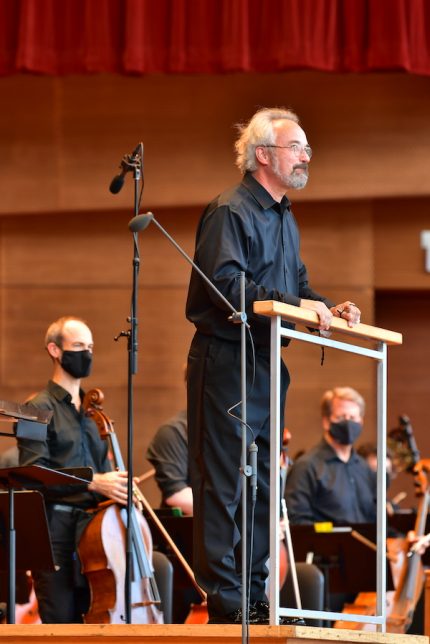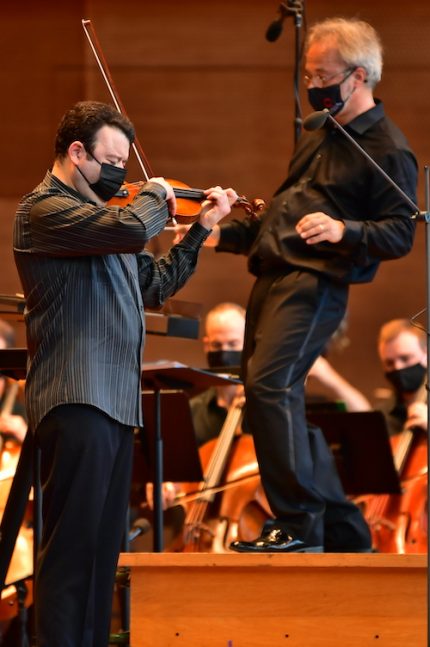Kalmar, Grant Park forces wrap season in magnificent style with Handel rarity

The final week of this summer’s Grant Park Music Festival—which returned in slightly shortened form after being on Covid-19 hiatus in 2020—has been an outstanding one for the Grant Park Chorus.
On Wednesday night the chorus was primus inter pares in two infrequently performed works: Schubert’s Mass in G major and Britten’s Rejoice in the Lamb. Chorus members estimably took all the solo parts, as they have all summer.
In the festival’s final program of the season, Christopher Bell’s ensemble was in the spotlight once again Friday night for another rarity, Handel’s “Dettingen” Te Deum. The program will be repeated on Saturday.
The inspiration of Handel’s 1743 work is manifest in its full title: Te Deum for the Victory at the Battle of Dettingen in D major. The work was written in 1843 to celebrate the victory of British and Austrian forces over the French at Dettingen in Franconia (now Germany). Despite the newspapers’ uninformed and self-serving hype—some things never change—the battle ultimately proved meaningless in consequence to the war and its aftermath. The Te Deum was not premiered, as intended, at a cancelled victory celebration at St. Paul’s Cathedral, but subsequent performances led to its enjoying significant popularity for nearly two centuries.
While the work’s uneasy mix of militaristic swagger and religious pieties don’t quite cohere, Handel’s Te Deum offers much glorious music throughout its 18 brief sections. The choral sections, especially, soar to such inspired heights that it’s hard to fathom why this piece isn’t heard more often.
All credit then to Carlos Kalmar, Christopher Bell and the Grant Park forces for providing such majestic advocacy for the Te Deum in its festival premiere.
From the epic opening chorus, “We praise Thee, O God,” the Grant Park Chorus was at their considerable finest, even while singing through masks. The opening chorus and celebratory numbers were exhilarating, sung with daunting power and brilliance with a spectacular account of “Thou didst open the kingdom of heaven.” And yet words were consistently clear through the cloth intermediaries and rhythms went with nimble articulation and pinpoint precision.
Bass soloist David Govertsen sounded dry of tone in his first aria “Thou Art the King of Glory,” though displayed impressive flexibility in the coloratura wielding such a large voice. He soon warmed up and brought pliant expression to “When Thou tookest upon Thee” and was reliably resonant and stentorian in “Vouchsafe, O Lord.”
Kalmar’s boldly projected style was well suited to this festive Baroque score. Yet he consciously downplayed the martial element, keeping a tight rein on timpani and trumpets while giving the chorus and rollicking woodwinds center stage.
Apart from fitfully swamping the singers in high-flying moments, the conductor skillfully underlined contrasts in tempos, dynamics and expression throughout this richly varied score. The Grant Park Orchestra wrapped the season with one of their finest outings of the summer across all sections, especially the clarion, bright-toned trumpet playing of David Gordon, William Denton and Michael Brozick.
To paraphrase the text of the Te Deum’s final stanza, may the Grant Park Chorus—and the rest of us—not be confounded with mask wearing when the festival returns next summer.
Preceding Handel’s opus was Mozart’s Violin Concerto No. 3 in G major with Vadim Gluzman as soloist.
The talented violinist and Northbrook resident continues to enjoy a high local profile—not least as co-founder with his wife, pianist Angela Yoffe, of the North Shore Chamber Music Festival, which marked its 10th anniversary in June.
One thinks of Gluzman as a violinist more at home in Late Romantic concertos and brilliant encore pieces than as a musician of a Mozartian sensibility. And while there was much stellar solo playing, Friday night’s performance of K. 216 tended to bolster that view.

Performing on his remarkable 1690 “ex-Leopold Auer” instrument—on extended loan from the Stradivari Society of Chicago—Gluzman brought characteristic juicy tone and technical gleam to Mozart’s youthful concerto. Even on a humid evening, the violinist’s storied technique was nearly immaculate apart from a slip of the bow in the final movement.
With fleet tempos, Gluzman’s brisk, forward-focused style worked best in the outer movements. There was a sense of bristling virtuosity below the surface waiting to break out, which imbued solo passages with a restless tension infrequently heard in this repertoire.
Still, a more yielding touch at times would have benefited Mozart’s music. The want of expressive light and shade was most felt in the Adagio, where Gluzman’s poised, patrician approach stayed entirely on the surface of the score. No one hearing this music for the first time would ever guess that this was one of Mozart’s most deeply expressive inspirations.
Also, whatever the historical justification, Gluzman playing along with the orchestra in the opening passages of the first two movements took anticipation and edge off of the soloist’s entrances and diluted the sense of a dramatic dialogue between soloist and orchestra.
The Rondo finale was the most successful. Gluzman reveled in the chance to finally unleash more overt brilliance, bringing a twisty playfulness to his solo passages. Kalmar’s springy rhythms and sympathetic accompaniment were fully in synch with his soloist, and the conductor ensured that Mozart’s quiet coda came off with the requisite grace.
The evening began with Elegia Andina by Gabriela Lena Frank. As with most of this American composer’s works, she draws prominently, and rather self-consciously, on elements of her far-flung ancestry (a Lithuanian-Jewish father and Chinese-Peruvian mother). In this instance, it is the Peruvian side that is mined, with the brass at one point playing the folk tune “El Cholito.”
Yet Elegia Andina is not folk pastiche as much as an extended tone poem. Leading off with a lyrical theme in horn and strings, the music segues into a pensive extended flute solo and a driving marcato section that bears some resemblance to the Argentinean Alberto Ginastera in his motoric, riding-the-Pampas mode.
Frank’s piece (written in 2000) is attractive and smartly orchestrated but, like many of her works, is episodic and tends to meander over its 11 minutes. If Elegia Andina ultimately feels like less than the sum of its parts, that was no fault of Kalmar and the Grant Park musicians who gave the score robust and vibrant advocacy—not least Mary Stolper’s atmospheric flute solos.
Prior to the concert, Michael Shelton was recognized for his 31 years of service, as both violinist and principal librarian of the Grant Park Orchestra. Shelton is retiring after playing his final concerts this weekend and his charming speech set an apt note of relaxed informality for the evening’s performances.
The program will be repeated 6:30 p.m. Saturday. gpmf.org
Posted in Uncategorized


